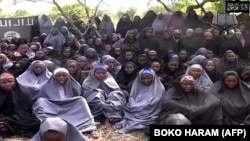ABUJA —
Some religious leaders in northern Nigeria are calling on the government to negotiate with Boko Haram militants for the release of the girls kidnapped last month.
They say military efforts to rescue the girls have failed and an international coalition is unlikely to succeed where local authorities cannot.
Nigerians have debated the wisdom of peace talks with Boko Haram militants for years.
Officials frequently say they are willing to negotiate but they also say they can’t negotiate with terrorists or hold a dialogue with “ghosts” -- a reference to the secretive nature of Boko Haram's leaders.
This week Boko Haram said it would release some of the nearly 300 schoolgirls it kidnapped in exchange for imprisoned members. Officials originally said they would consider all options.
But on Wednesday, Britain's Minister for Africa, Mark Simmonds, said Nigerian President Goodluck Jonathan "made it very clear that there will be no negotiation" with Boko Haram.
Abdullahi Bayero, spokesperson for the Supreme Council of Shariah in Nigeria, says the military has failed to rescue the girls but dialogue might save them.
“Formerly the government has said ‘You cannot deal with a ghost. You don’t know whom you are dealing with. They are doing guerilla wars. They are doing this. They are doing that,’" Bayero said. "Now in the infinite mercy of God we know where they are.”
Even if the girls are rescued, he says, without negotiations, the circumstances surrounding Boko Haram's emergence remain and the group will continue to thrive.
Boko Haram began as a fundamentalist sect in the early 2000s, becoming violent in 2009. Bayero says its anti-government and anti-Western ideology took root in part because most people in northeastern Nigeria live in abject poverty.
Boko Haram has now grown into an extremist insurgency, killing thousands of people, including hundreds of schoolchildren. The fact that the government cannot protect the public causes feelings of distrust, says Bayero.
“Now the government has to understand, to know what their responsibility on their citizens," he said. "What is the right of the people that they are governing? What is their right to live as a country? In as long as you can allow people to be killing, there is insecurity, of course it has to cause all these issues.”
Other northern religious leaders say the Boko Haram insurgency has been described to the public in a partial and confusing way, especially in connection to the kidnapped girls.
Pastor Yohanna Buru, who heads from the Peace Revival and Reconciliation Foundation of Nigeria in the northern city of Kaduna, says the public still doesn’t know exactly how many girls are missing or what is being done to rescue them.
He backs the idea of a swap to release the girls.
“Now, he [Boko Haram leader Abubakar Shekau] said that they should release their colleagues for an exchange with these ladies," Buru said. "Why won’t the government do that? They should do it if they’re doing that in good faith and if they really want dialogue.”
This week several countries and the United Nations pledged to help Nigeria rescue the girls and fight Boko Haram.
On Tuesday, Minister of Foreign Affairs Aminu Wali expressed his appreciation for the foreign assistance but warned that amid high hopes for the girls’ safe return, Nigerians need to manage their expectations.
Ibrahima Yakubu contributed to this report from Kaduna.
They say military efforts to rescue the girls have failed and an international coalition is unlikely to succeed where local authorities cannot.
Nigerians have debated the wisdom of peace talks with Boko Haram militants for years.
Officials frequently say they are willing to negotiate but they also say they can’t negotiate with terrorists or hold a dialogue with “ghosts” -- a reference to the secretive nature of Boko Haram's leaders.
Boko Haram
Boko Haram
- Based in the northeastern city of Maiduguri
- Self-proclaimed leader is Abubakar Shekau
- Began in 2002 as a nonviolent Islamist splinter group
- Launched uprising in 2009
- Has killed tens of thousands since 2010
- Boko Haram translates to "Western education is sinful"
- Wants Nigeria to adopt strict Islamic law
But on Wednesday, Britain's Minister for Africa, Mark Simmonds, said Nigerian President Goodluck Jonathan "made it very clear that there will be no negotiation" with Boko Haram.
Abdullahi Bayero, spokesperson for the Supreme Council of Shariah in Nigeria, says the military has failed to rescue the girls but dialogue might save them.
“Formerly the government has said ‘You cannot deal with a ghost. You don’t know whom you are dealing with. They are doing guerilla wars. They are doing this. They are doing that,’" Bayero said. "Now in the infinite mercy of God we know where they are.”
Even if the girls are rescued, he says, without negotiations, the circumstances surrounding Boko Haram's emergence remain and the group will continue to thrive.
Boko Haram began as a fundamentalist sect in the early 2000s, becoming violent in 2009. Bayero says its anti-government and anti-Western ideology took root in part because most people in northeastern Nigeria live in abject poverty.
Boko Haram has now grown into an extremist insurgency, killing thousands of people, including hundreds of schoolchildren. The fact that the government cannot protect the public causes feelings of distrust, says Bayero.
“Now the government has to understand, to know what their responsibility on their citizens," he said. "What is the right of the people that they are governing? What is their right to live as a country? In as long as you can allow people to be killing, there is insecurity, of course it has to cause all these issues.”
Other northern religious leaders say the Boko Haram insurgency has been described to the public in a partial and confusing way, especially in connection to the kidnapped girls.
Pastor Yohanna Buru, who heads from the Peace Revival and Reconciliation Foundation of Nigeria in the northern city of Kaduna, says the public still doesn’t know exactly how many girls are missing or what is being done to rescue them.
He backs the idea of a swap to release the girls.
“Now, he [Boko Haram leader Abubakar Shekau] said that they should release their colleagues for an exchange with these ladies," Buru said. "Why won’t the government do that? They should do it if they’re doing that in good faith and if they really want dialogue.”
This week several countries and the United Nations pledged to help Nigeria rescue the girls and fight Boko Haram.
On Tuesday, Minister of Foreign Affairs Aminu Wali expressed his appreciation for the foreign assistance but warned that amid high hopes for the girls’ safe return, Nigerians need to manage their expectations.
Ibrahima Yakubu contributed to this report from Kaduna.






